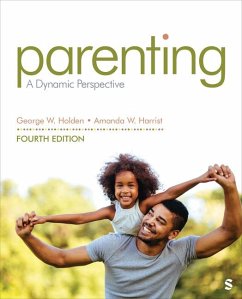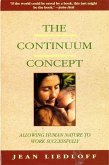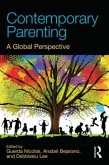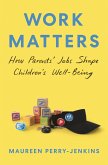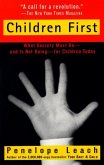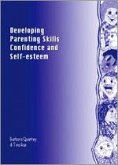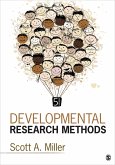- Broschiertes Buch
- Merkliste
- Auf die Merkliste
- Bewerten Bewerten
- Teilen
- Produkt teilen
- Produkterinnerung
- Produkterinnerung
Parenting: A Dynamic Perspective explores the interaction between parents and children as they shape each other over time. George Holden and Amanda Harrist present the latest interdisciplinary research on parenting in an engaging and accessible manner.
Andere Kunden interessierten sich auch für
![The Continuum Concept The Continuum Concept]() Jean LiedloffThe Continuum Concept15,99 €
Jean LiedloffThe Continuum Concept15,99 €![Contemporary Parenting Contemporary Parenting]() Contemporary Parenting65,99 €
Contemporary Parenting65,99 €![Work Matters Work Matters]() Maureen Perry-JenkinsWork Matters20,99 €
Maureen Perry-JenkinsWork Matters20,99 €![Children First Children First]() Penelope LeachChildren First12,99 €
Penelope LeachChildren First12,99 €![Developing Parenting Skills, Confidence and Self-Esteem Developing Parenting Skills, Confidence and Self-Esteem]() Barbara QuarteyDeveloping Parenting Skills, Confidence and Self-Esteem65,99 €
Barbara QuarteyDeveloping Parenting Skills, Confidence and Self-Esteem65,99 €![Developmental Research Methods Developmental Research Methods]() Scott A MillerDevelopmental Research Methods211,99 €
Scott A MillerDevelopmental Research Methods211,99 €![Parentectomy Parentectomy]() Christine GiancarloParentectomy23,99 €
Christine GiancarloParentectomy23,99 €-
-
-
Parenting: A Dynamic Perspective explores the interaction between parents and children as they shape each other over time. George Holden and Amanda Harrist present the latest interdisciplinary research on parenting in an engaging and accessible manner.
Produktdetails
- Produktdetails
- Verlag: Sage Publications
- 4th edition
- Seitenzahl: 648
- Erscheinungstermin: 17. September 2024
- Englisch
- Gewicht: 907g
- ISBN-13: 9781071908778
- ISBN-10: 1071908774
- Artikelnr.: 70011291
- Herstellerkennzeichnung
- Libri GmbH
- Europaallee 1
- 36244 Bad Hersfeld
- gpsr@libri.de
- Verlag: Sage Publications
- 4th edition
- Seitenzahl: 648
- Erscheinungstermin: 17. September 2024
- Englisch
- Gewicht: 907g
- ISBN-13: 9781071908778
- ISBN-10: 1071908774
- Artikelnr.: 70011291
- Herstellerkennzeichnung
- Libri GmbH
- Europaallee 1
- 36244 Bad Hersfeld
- gpsr@libri.de
GEORGE W. HOLDEN, Ph.D. is Professor of Psychology at Southern Methodist University in Dallas, TX. He received his B.A. from Yale University and his M.A. and Ph.D. from the University of North Carolina at Chapel Hill. After earning his degree in developmental psychology with a minor in social psychology, he was a member of the psychology faculty at the University of Texas for 23 years. While at U.T., he was head of the developmental area from 1990 to 1996 and the Director of the Institute of Human Development and Family Studies from 1995 to 1997. For five years (1999 to 2004) he served as Associate Chair of the Psychology Department. He is a fellow of the American Psychological Society and a member of the Society for Research in Child Development, the American Professional Society on the Abuse of Children, and the Society for Research in Human Development, where he is currently President. He has been or is on the editorial boards of Child Development, Developmental Psychology, Journal of Family Psychology, Parenting, and the Journal of Emotional Abuse. Dr. Holden's research interests are in the area of social development, with a focus on parent-child relationships. He is especially interested in understanding the determinants of parental behavior, parental social cognition, and the causes and consequences of family violence. For example, he has investigated how parenting is affected and children are impacted by marital violence. Another topic he has investigated in several studies is parental use of physical punishment and children's perception of it. His research has been supported by grants from the National Institute of Child Health and Human Development, Department of Health and Human Services, National Institutes of Justice, the Guggenheim Foundation, and the Hogg Foundation for Mental Health. He is the author of numerous scientific articles and chapters, and the books Parenting: A dynamic perspective (Sage, 2010) and Parents and the Dynamics of Child Rearing (Westview, 1997). In addition he co-edited Children Exposed to Marital Violence (American Psychological Association, 1998) and the Handbook of Family Measurement Techniques, Vol. 2 & 3 (Sage, 2001). He is married and has three children.
PART ONE. Setting the Stage
1. Introduction
Parenting Beliefs Throughout History
Authorities' Parenting Beliefs Throughout History
Other Sources of Parenting Beliefs
Using Research to Understand Parenting
Chapter Conclusions
Thought Questions
2. Theoretical Perspectives on Parenting
Introduction to Theory
Classical Theories
Biological, Genetic, and Environmental Influences
Theories Focused on Social Interaction and Social Cognition
Systemic Theories
Developmental Stage Theories
Mid-Range Theories
Chapter Conclusions
Thought Questions
3. Determinants of Parenting
Categories of Determinants
Cultural and Distal Determinants
Contextual Determinants
Stable Characteristics Determinants
Situational Determinants
Interrelations Among Determinants
Chapter Conclusions
Thought Questions
PART TWO. PARENTING AND DEVELOPMENT
4. Becoming a Parent
Getting Pregnant, Staying Pregnant, and Encountering Problems
Labor and Childbirth
The Preterm Baby
Transitioning to Parenthood
Parenting the Newborn
The Problem of Infant Mortality
Ethical Issues
Chapter Conclusions
Thought Questions
5. Parenting Infants and Toddlers
Parenting Infants
Parenting Toddlers
Chapter Conclusions
Thought Questions
6. Parenting Preschoolers
Developmental Issues With Preschoolers
Contemporary Issues
Chapter Conclusions
Thought Questions
7. Parenting During the Middle Childhood Years
Introduction to Parent-Child Relations During Middle Childhood
Parents and Within-Family Interactions
Parents and External Influences
Chapter Conclusions
Thought Questions
8. Parenting Adolescents
Developmental Changes in Adolescence
Problems for Adolescents and Their Parents
How Parents Help Teens Navigate Adolescence
Chapter Conclusions
Thought Questions
9. Parenting Adult Children
Roles and Relationships
Role Expectations and Relationships in the Context of Child Age
Role Expectations and Parent-Adult Child Relationships in Cultural Context
Chapter Conclusions
Thought Questions
Part Three. Parenting Today
10. Parenting in its Contemporary Forms
Diverse Family Structures
Nontraditional Parent Characteristics
Diverse Parental Roles or Occupations
Chapter Conclusions
Thought Questions
11. Parents at Risk
Parent Characteristics
Child Characteristics
Parent Context
Support for and Resilience in At-Risk Parents
Chapter Conclusions
Thought Questions
12. Parenting Across Cultures
Child-Rearing Across Cultures
Cross-Cultural Comparisons of Parenting
Chapter Conclusions
Thought Questions
13. Cultural Diversity in U.S. Parents
Cultural Diversity Among U.S. Parents
Minority Groups
Religion and Parenting
Chapter Conclusions
Thought Questions
14. Child Maltreatment: When Parenting Goes Awry
Child Maltreatment Throughout History
The Many Faces of Child Maltreatment
Maltreatment Across Studies, Time, and Countries
Protecting Maltreated Children: Foster Parents
The Costs of Child Maltreatment
Chapter Conclusions
Thought Questions
15. Parents and Social Policy
The Changing American Family
The Societal Costs of Family Problems
Social Policy Responses
Controversial Social Policy Ideas
Chapter Conclusions
Thought Questions
1. Introduction
Parenting Beliefs Throughout History
Authorities' Parenting Beliefs Throughout History
Other Sources of Parenting Beliefs
Using Research to Understand Parenting
Chapter Conclusions
Thought Questions
2. Theoretical Perspectives on Parenting
Introduction to Theory
Classical Theories
Biological, Genetic, and Environmental Influences
Theories Focused on Social Interaction and Social Cognition
Systemic Theories
Developmental Stage Theories
Mid-Range Theories
Chapter Conclusions
Thought Questions
3. Determinants of Parenting
Categories of Determinants
Cultural and Distal Determinants
Contextual Determinants
Stable Characteristics Determinants
Situational Determinants
Interrelations Among Determinants
Chapter Conclusions
Thought Questions
PART TWO. PARENTING AND DEVELOPMENT
4. Becoming a Parent
Getting Pregnant, Staying Pregnant, and Encountering Problems
Labor and Childbirth
The Preterm Baby
Transitioning to Parenthood
Parenting the Newborn
The Problem of Infant Mortality
Ethical Issues
Chapter Conclusions
Thought Questions
5. Parenting Infants and Toddlers
Parenting Infants
Parenting Toddlers
Chapter Conclusions
Thought Questions
6. Parenting Preschoolers
Developmental Issues With Preschoolers
Contemporary Issues
Chapter Conclusions
Thought Questions
7. Parenting During the Middle Childhood Years
Introduction to Parent-Child Relations During Middle Childhood
Parents and Within-Family Interactions
Parents and External Influences
Chapter Conclusions
Thought Questions
8. Parenting Adolescents
Developmental Changes in Adolescence
Problems for Adolescents and Their Parents
How Parents Help Teens Navigate Adolescence
Chapter Conclusions
Thought Questions
9. Parenting Adult Children
Roles and Relationships
Role Expectations and Relationships in the Context of Child Age
Role Expectations and Parent-Adult Child Relationships in Cultural Context
Chapter Conclusions
Thought Questions
Part Three. Parenting Today
10. Parenting in its Contemporary Forms
Diverse Family Structures
Nontraditional Parent Characteristics
Diverse Parental Roles or Occupations
Chapter Conclusions
Thought Questions
11. Parents at Risk
Parent Characteristics
Child Characteristics
Parent Context
Support for and Resilience in At-Risk Parents
Chapter Conclusions
Thought Questions
12. Parenting Across Cultures
Child-Rearing Across Cultures
Cross-Cultural Comparisons of Parenting
Chapter Conclusions
Thought Questions
13. Cultural Diversity in U.S. Parents
Cultural Diversity Among U.S. Parents
Minority Groups
Religion and Parenting
Chapter Conclusions
Thought Questions
14. Child Maltreatment: When Parenting Goes Awry
Child Maltreatment Throughout History
The Many Faces of Child Maltreatment
Maltreatment Across Studies, Time, and Countries
Protecting Maltreated Children: Foster Parents
The Costs of Child Maltreatment
Chapter Conclusions
Thought Questions
15. Parents and Social Policy
The Changing American Family
The Societal Costs of Family Problems
Social Policy Responses
Controversial Social Policy Ideas
Chapter Conclusions
Thought Questions
PART ONE. Setting the Stage
1. Introduction
Parenting Beliefs Throughout History
Authorities' Parenting Beliefs Throughout History
Other Sources of Parenting Beliefs
Using Research to Understand Parenting
Chapter Conclusions
Thought Questions
2. Theoretical Perspectives on Parenting
Introduction to Theory
Classical Theories
Biological, Genetic, and Environmental Influences
Theories Focused on Social Interaction and Social Cognition
Systemic Theories
Developmental Stage Theories
Mid-Range Theories
Chapter Conclusions
Thought Questions
3. Determinants of Parenting
Categories of Determinants
Cultural and Distal Determinants
Contextual Determinants
Stable Characteristics Determinants
Situational Determinants
Interrelations Among Determinants
Chapter Conclusions
Thought Questions
PART TWO. PARENTING AND DEVELOPMENT
4. Becoming a Parent
Getting Pregnant, Staying Pregnant, and Encountering Problems
Labor and Childbirth
The Preterm Baby
Transitioning to Parenthood
Parenting the Newborn
The Problem of Infant Mortality
Ethical Issues
Chapter Conclusions
Thought Questions
5. Parenting Infants and Toddlers
Parenting Infants
Parenting Toddlers
Chapter Conclusions
Thought Questions
6. Parenting Preschoolers
Developmental Issues With Preschoolers
Contemporary Issues
Chapter Conclusions
Thought Questions
7. Parenting During the Middle Childhood Years
Introduction to Parent-Child Relations During Middle Childhood
Parents and Within-Family Interactions
Parents and External Influences
Chapter Conclusions
Thought Questions
8. Parenting Adolescents
Developmental Changes in Adolescence
Problems for Adolescents and Their Parents
How Parents Help Teens Navigate Adolescence
Chapter Conclusions
Thought Questions
9. Parenting Adult Children
Roles and Relationships
Role Expectations and Relationships in the Context of Child Age
Role Expectations and Parent-Adult Child Relationships in Cultural Context
Chapter Conclusions
Thought Questions
Part Three. Parenting Today
10. Parenting in its Contemporary Forms
Diverse Family Structures
Nontraditional Parent Characteristics
Diverse Parental Roles or Occupations
Chapter Conclusions
Thought Questions
11. Parents at Risk
Parent Characteristics
Child Characteristics
Parent Context
Support for and Resilience in At-Risk Parents
Chapter Conclusions
Thought Questions
12. Parenting Across Cultures
Child-Rearing Across Cultures
Cross-Cultural Comparisons of Parenting
Chapter Conclusions
Thought Questions
13. Cultural Diversity in U.S. Parents
Cultural Diversity Among U.S. Parents
Minority Groups
Religion and Parenting
Chapter Conclusions
Thought Questions
14. Child Maltreatment: When Parenting Goes Awry
Child Maltreatment Throughout History
The Many Faces of Child Maltreatment
Maltreatment Across Studies, Time, and Countries
Protecting Maltreated Children: Foster Parents
The Costs of Child Maltreatment
Chapter Conclusions
Thought Questions
15. Parents and Social Policy
The Changing American Family
The Societal Costs of Family Problems
Social Policy Responses
Controversial Social Policy Ideas
Chapter Conclusions
Thought Questions
1. Introduction
Parenting Beliefs Throughout History
Authorities' Parenting Beliefs Throughout History
Other Sources of Parenting Beliefs
Using Research to Understand Parenting
Chapter Conclusions
Thought Questions
2. Theoretical Perspectives on Parenting
Introduction to Theory
Classical Theories
Biological, Genetic, and Environmental Influences
Theories Focused on Social Interaction and Social Cognition
Systemic Theories
Developmental Stage Theories
Mid-Range Theories
Chapter Conclusions
Thought Questions
3. Determinants of Parenting
Categories of Determinants
Cultural and Distal Determinants
Contextual Determinants
Stable Characteristics Determinants
Situational Determinants
Interrelations Among Determinants
Chapter Conclusions
Thought Questions
PART TWO. PARENTING AND DEVELOPMENT
4. Becoming a Parent
Getting Pregnant, Staying Pregnant, and Encountering Problems
Labor and Childbirth
The Preterm Baby
Transitioning to Parenthood
Parenting the Newborn
The Problem of Infant Mortality
Ethical Issues
Chapter Conclusions
Thought Questions
5. Parenting Infants and Toddlers
Parenting Infants
Parenting Toddlers
Chapter Conclusions
Thought Questions
6. Parenting Preschoolers
Developmental Issues With Preschoolers
Contemporary Issues
Chapter Conclusions
Thought Questions
7. Parenting During the Middle Childhood Years
Introduction to Parent-Child Relations During Middle Childhood
Parents and Within-Family Interactions
Parents and External Influences
Chapter Conclusions
Thought Questions
8. Parenting Adolescents
Developmental Changes in Adolescence
Problems for Adolescents and Their Parents
How Parents Help Teens Navigate Adolescence
Chapter Conclusions
Thought Questions
9. Parenting Adult Children
Roles and Relationships
Role Expectations and Relationships in the Context of Child Age
Role Expectations and Parent-Adult Child Relationships in Cultural Context
Chapter Conclusions
Thought Questions
Part Three. Parenting Today
10. Parenting in its Contemporary Forms
Diverse Family Structures
Nontraditional Parent Characteristics
Diverse Parental Roles or Occupations
Chapter Conclusions
Thought Questions
11. Parents at Risk
Parent Characteristics
Child Characteristics
Parent Context
Support for and Resilience in At-Risk Parents
Chapter Conclusions
Thought Questions
12. Parenting Across Cultures
Child-Rearing Across Cultures
Cross-Cultural Comparisons of Parenting
Chapter Conclusions
Thought Questions
13. Cultural Diversity in U.S. Parents
Cultural Diversity Among U.S. Parents
Minority Groups
Religion and Parenting
Chapter Conclusions
Thought Questions
14. Child Maltreatment: When Parenting Goes Awry
Child Maltreatment Throughout History
The Many Faces of Child Maltreatment
Maltreatment Across Studies, Time, and Countries
Protecting Maltreated Children: Foster Parents
The Costs of Child Maltreatment
Chapter Conclusions
Thought Questions
15. Parents and Social Policy
The Changing American Family
The Societal Costs of Family Problems
Social Policy Responses
Controversial Social Policy Ideas
Chapter Conclusions
Thought Questions

